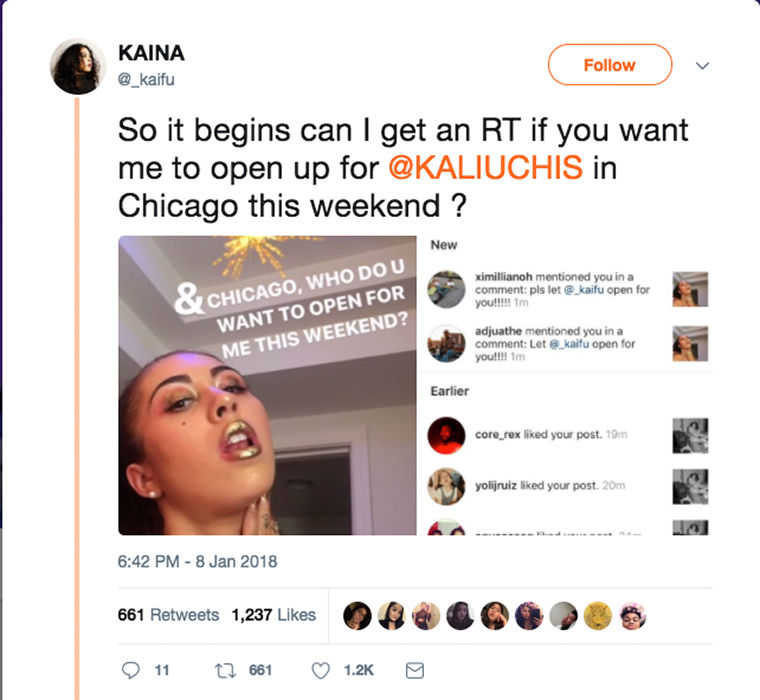‘I’m with the brand’: social media influences fan, artist interactions
Kaina Castillo reached out to her fans on Twitter urging them to contact Kali Uchis and suggest her as her opening act.
January 21, 2018
With savvy fan engagement, singer Kali Uchis posted to various social media platforms Jan. 8 asking fans to recommend an opener for the Chicago leg of her tour, which began Jan. 5.
After an avalanche of tweets—including a retweet from Chance the Rapper—and Instagram posts from friends and family, local singer Kaina Castillo was crowned the lucky winner.
“I do a lot of work with a lot of people in Chicago besides music, on a production end or community work end,” Castillo, a 22-year-old Chicago resident said in an email interview. “With their help and general community, it all came together to be this massive collective thing I didn’t expect.”
In the past, fan clubs and especially individual fans had limited access to artists. Social media, however, allows fans to leverage their collective weight online to create a unit that is greater than the sum of its parts, said Clayton Smith, assistant professor of instruction in the Business and Entrepreneurship Department.
The digital age, Smith said, has transformed what fans can do for artists and vice versa.
“For the artist, social media is about community, and for the consumers and the fans, it’s about access,” Smith said. “If the artist can create and foster a feeling of community among fans, that’s such a powerful tool to make people feel like they are a part of something bigger.”
Even high-grossing legacy act Metallica has rallied online fans to gain hype for its “WorldWired” tour by creating the “Hit The Stage” contest. Not only did Metallica have fans pick openers through their local radio stations websites, but in 2013, they also had fans pick their preferred song list.
Minnesota-based band Step Rockets opened for Bon Jovi as a result of a 2017 online contest. While Step Rockets uses Facebook, Twitter and Instagram to an extent, guitarist Brady Lillie said there is no substitute for some old-fashioned elbow grease.
“There is no shortcut for hard work, what social media does for us is it allows us to connect with people on an international scale,” Lillie said. He pointed out the dangers of online oversaturation.
“We didn’t really push [the contest] that hard because we were releasing a single shortly after,” Lillie said. “We’re cognizant about pushing advertisements and social media posts.
He said the band won the contest due to its music’s merit, not because of a social media push.
Max Reichert, a vocalist in the Ohio-based band Clubhouse, said social media is not viable without a personal connection first. Reichert added that winning a performance at Firefly Music Festival was the result of a GroupMe message. Music fans in the 21st century are more than concert goers—they are active participants in their favorite acts’ careers, according to Smith.
“It wasn’t until this all came together to get me booked for the show that I realized how powerful community engagement was for me as an independent artist,” Castillo said.








